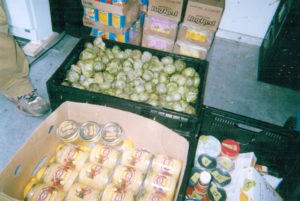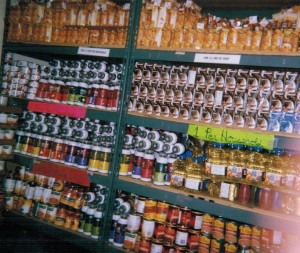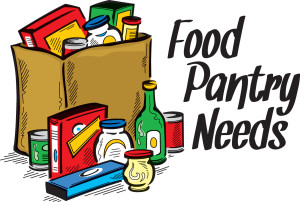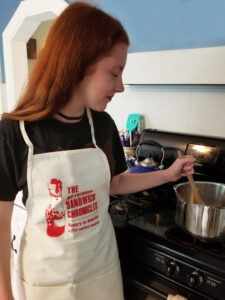Writing this Blog Post was Risky

Writing this blog post was risky. In the early days I worried about peoples’ opinions. I wrote my first blog entries with skeptics in mind. On some level it was important to me for pantry deniers to understand that there are, indeed, hungry people around us
One day I saw clearly that some people aren’t going to like me or my work. Nor are they going to believe what I write, no matter what I say. Once I realized that truth, I knew I’d been wasting energy on other people’s opinions.
I’m no longer interested in convincing anyone about what it means to go to bed hungry.
I’m okay with people saying anything about me because I know the chapters I write are true. The words I write make a difference in peoples’ lives.
This blog is about people creating better lives for themselves while not having enough to eat and lacking proper healthcare, housing.
This blog is about healing and creating new opportunities in one’s life. This blog is about people changing their lives – against all odds.
While I tell this story, I know some people won’t believe a word. It’s okay. I have my story and they have their story.
Food and sex and money are three words and issues more concerned with a person’s core beliefs, emotions, and spiritual attitudes than anything else.
These three words offer rules for everyone. We each have core beliefs around them with opinions about what is okay and what isn’t okay. We have attitudes about food, sex, and money based on what we were taught by family members and peers when we were children. We live our lives based on those experiences. Reduced to their lowest common denominator, these words – food, sex, and money – are the same. They touch core beliefs in ways going straight to the heart and soul.
The food pantry was all about food and money. The sex part was limited, but still there. Sex happened in the pantry hallway line when a shopper suffering with mental illness, a handsome young man who lived in another world, masturbated in the food line.
Our attitudes, opinions, feelings about feeding hungry people are or are not based on facts, statistics, or reality. Nor will facts, statistics, information, change attitudes.
Finally, we all have beliefs about who it’s okay to feed and who it’s not okay to feed. My beliefs are based on life experiences, facts, statistics. Their beliefs are based on the same. I may have taken classes, gone to therapy. And, they may have also.
Their reality about what is okay and my reality about what is okay differ.
In the food pantry hallway, we all looked at the same people and saw different things. This situation is proof positive we each create our own reality about hungry people. Nothing changes either reality. We each see hungry people through lenses shaped by separate life experiences. Hungry people don’t live in two realities.
As the lines got longer, we looked at people in the line. I saw hungry people and they didn’t. I interacted with people weekly who dumpster-dived to feed themselves as well as their children, parents, housemates. Occasionally I read articles about the ethics of dumpster diving. I didn’t think we could explore the ethics of allowing people go hungry because they couldn’t make enough money at their jobs to buy the food they needed to live and work.
People coming to a food pantry can take a three-day-supply of food home each week. The other four days, they’re on their own. That means they can buy more food if they have a SNAP card and if they can get to a store selling food. If they don’t have the money or a SNAP card, they get creative or go hungry. This involves panhandleing, borrowing money or food from friends, relatives, neighbors. They can steal, dumpster-dive, drop in at someone’s house at mealtime, and skip meals.
“Thurman is out of control over at the food pantry” described the local vicar because of the number of people shopping at the pantry and the amount of food they took home.
Thank you for reading this blog post. Please refer it to your favorite social media network.
Thurman Greco


Serving the Hungry with an Understanding Heart
 O Lord, You are a God of Abundance.
O Lord, You are a God of Abundance.
Allow me to serve the hungry with an open heart.
Give me the courage to distribute food without strings attached when volunteers are serving the hungry.
May I never need to keep score.
Give me the physical strength to keep the shelves of the pantry stocked with as much food as we can pack on them.
Grant me the emotional stamina to understand the many needs of the shoppers.
Never let me get so tired that I forget we are all one group: Yours
At the food pantry, hunger is hunger. It doesn’t matter what size the household is, what size the car is, or what or where the family calls home. At the food pantry, no one has to complete an application shop. What’s important is that the person is in the line and there is food for that person and his/her household.
Lord, You send over the food, You send over the people and You send over enough food for everyone with some left over. This happens every pantry day on every week. People are always welcome. Lord, You bring people together through the food pantry.
Thank You for all You do for the hungry.
Amen
Thank you for reading this blog.
Please share this article with your social media network.
Peace and food for all.
Thurman Greco – Woodstock, New York

My Story and the 9 Truths I Discovered
I began my life changing journey fighting hunger on a cool autumn Thursday in Woodstock, New York in 2005 where I volunteered for the first time at the local food pantry.
I was assigned a shift with Marie Duane. I drove over to the Woodstock Reformed Church, parked my car behind the buildling and cautiously walked in. I had never been to the pantry before.
I entered the empty hallway and found the pantry on the right. I walked into the room and there it was: a small space, actually, about 12′ by 16′. Each wall supported a set of metal shelving units. Each unit stood about 6′ high and 3′ deep with 4 shelves. Most of the shelves were empty. A few shelves had some food:
cereal
tuna
soup
peanut butter.
There was a little handwritten note in front of each display:
person: 1 item, family: 1 item.
There may have been other items on shelves but I don’t remember them.
A small table stood in the center of the room. A metal folding chair was placed in front of each window.
We sat in the chairs, Marie and I, and chatted as people trickled in. We discussed the usual: weather, gardening, knitting, decorating the alter at St. Gregory’s Episcopal Church.
“Hi. How are you? Will you please sign your name here?” Each shopper signed in and noted the number of adults, seniors, and children in the household. After signing in, the person walked around the room selecting from the cereal, peanut butter, tuna, and soup. The selected food was placed on the table and bagged to take home, wherever or whatever that was.
On this morning, not blessed with any psychic knowledge, I was totally unaware of experiences waiting for me in the pantry. Never in my wildest thoughts did I envision the hall filled with hungry people, the tiny room packed with fresh produce and jammed with shoppers.
Nor did I for 1 moment ponder the push back I would experience as the number of hungry seeking food grew. Within a few short years, this 2 dozen single homeless men – mostly Woodstock’s colorful characters – had swelled (due to a tanking economy) to over 300 people weekly. This number finally approached 500 people weekly before it was all over.
Now, in the autumn of 2015, our stock market experiences numerous “corrections”. I realize I learned some things over the years which, for me, are ground truths about the pantry.
Feeding the hungry with dignity is the most important thing.
Single homeless men are now far outnumbered by members of the Struggling Class, households of working people holding down 2 and 3 jobs just to pay the rent and buy the gas to get to work.
The 3 most hot button words in the English language are food, sex, and money. These 3 words are concerned with a person’s core beliefs, emotions, and spiritual attitudes. Food and money, or the lack thereof, loom large in pantries.
The sidewalks in our communities and cities have become wards of untreated mentally ill people. In our great nation we don’t hospitalize or otherwise treat many of our mentally ill. Instead, they they are incarcerated.
Some of these untreated mentally ill happen to be homeless. Homeless is not a category of people. It’s just a situation that happens. It can happen to anyone.
The 50+ senior population has many who lack enough $$$ for food and are largely a silent group. The bottom line is this: When our grandparents don’t get enough to eat, they often get sick.
I’m seeing a whole generation of children who have never been inside a grocery store.
Shoppers at our pantry can get a 3-day supply of food weekly. Their job is to make it last 7 days. Many share this food with a pet. Often, the only thing a person has left from a prosperous past is the dog.
The most difficult thing I see in the pantry is a Korean War vet getting food. Something I just can’t understand is how a person who served in a very brutal war, and subsequently spent an adult life working and paying taxes should have to be in a food pantry line in his old age.
Much of the food available to the hungry in food pantries is diverted from its trip to the landfill.
There is absolutely no excuse for anyone in our great nation to go hungry.
Thank you for reading this blog. The story is true. The people are real.
Please refer this article to your preferred social media network. Share this story with friends or relatives who might be interested.
Don’t forget to join the email list.
Thurman Greco
Grocery shopping is always a problem for the elderly.
I first met her outside the shed at the Reservoir Food Pantry. A recent widow, I heard her comment “I just never knew how hard it was going to be as a widow.” Her husband died just over a year ago and she’s still making her way toward accepting her new reality.
“I never knew it would be so difficult…being alone like this. I’ll never tell my children I come here. I don’t want them to know.”
As she spoke, she wiped an occasional tear while moving through the pantry line with a group of women, all about her own age. They were choosing corn and apples, squashes, greens, onions, potatoes. As the line snaked forward, she turned her attention to the canned goods: beans, soup, fruits, veggies.
Pat hasn’t made it to the food stamp office in Kingston. For one thing, it’s a good half hour down Route 28. For another, she’s afraid:
of the forms,
the humiliation of being unable to survive on her own,
the long wait in a building she may not even be able to find,
finally, she’s afraid of the whole process which she finds frightening.
Her financial situation isn’t so far from all the other older women in the pantry line. Grocery shopping for the elderly is difficult under the best of circumstances. Getting to the grocery store can be challenging for older people – getting around in the parking lot and going up and down the grocery store aisles is no fun anymore. And, then, when they can’t find what they need, they have to maneuver the muddy parking area and the scary entrance ramp at the pantry. And…we haven’t even discussed the packages yet. They’ve got to be gotten home and in the house (wherever and whatever that is).
Finally, getting high quality, affordable food is more and more difficult as the days go by. And, as difficult as it is for Pat, she’s one of the lucky ones. She’s got a working automobile.
Combine the lack of a working automobile, bad weather, not enough $$$ and you’ve got the makings of a disaster for a senior.
I keep telling everyone who’ll listen that seniors should get their SNAP card, a list of nearby pantries, and their first social security check at the same time. So far, nobody has listened. Of course not. Why should they? We’ve all got gray hair.
Seniors struggle with the big 3:
food
housing
medical expenses.
Forget the extras like clothing. As seniors, we get less, pay more, and go without. When I need something new to wear, I go to the boutique of my closet.
Healthcare costs can be devastating, even to a senior with medicare. Once a person comes down with cancer or other expensive disease, the pocketbook empties pretty fast.
There is real pressure to feed the rising tide of hungry people at every pantry. We get questionnaires periodically from different agencies wanting to know how often we run out of food. How does “weekly” sound?
The Big 3 for pantries include:
high unemployment
widespread poverty
deep cuts in social spending programs.
Pantries, for the most part, are
arbitrary,
subjective,
strongly biased
when it comes to deciding who can and cannot receive food. There are simply too many agencies with too many people standing in line for too little food for any food bank or state office to properly oversee and supervise the selection process.
As far as feeding the hungry, we’re not even coming close to filling the need created by the widespread poverty and deep spending cuts. People in food pantry lines are, in a severe winter, choosing between eating and heating.
Our pantry, housed in a shed, an old green house, and the back of a restaurant is a ragtag emergency food movement which is in reality not emergency at all.
Lines and crowds outside our pantry on Monday afternoons can easily convince any onlooker that the good old U S of A has a food problem.
http://www.reservoirfoodpantry.org
Thank you for reading this blog/book.
Please send a comment.
Please share this article with your preferred social media network.
Don’t forget to join the email list.
Peace and food for all.
Thurman
The Big 3: We get less, pay more, and do without.
WHAT GROCERIES CAN YOU BUY FOR $16?
(The Minium SNAP Allotment)
Prices from Kingston Walmart
– 1 dozen eggs – $1.98
– 1/2 gallon milk – $1.94
– 1 lb. pinto beans – $1.28
– 1 lb. rice – $ .84
– 1 lb. onions – $ .99
– 1 can diced tomatoes – $ .79
– 1 lb ground turkey – $2.98
– 1 can corn – $ .77
– 1 lb. potatoes – $2.97
– 1 can tuna – $ .78
Total = $15.32
I first met Pat last fall when she came to the Reservoir Food Pantry the first time. She’s an older woman, a widow. Her husband died just over a year ago She’s still making her way toward her new life.
“I never dreamed it would be so hard…being alone like this. I didn’t tell my children that I came here. I don’t want them to know the situation.”
While she spoke, she wiped an occasional tear. She moved through the pantry line composed of a group of women, all about her own age. They chose corn, apples, squash, late season greens, onions, potatoes. As the line snaked forward, she turned her attention to the canned goods: beans, soup, fruits, veggies.
Pat hasn’t visited the SNAP (food stamp) office in Kingston yet. For one thing, it’s a good half hour down Route 28. For another, she’s afraid:
the forms,
the humiliation of being unable to survive on her own,
the long wait in a building that she may not even be able to find. And, finally, she’s afraid of the whole process which she finds threatening.
Her financial situation isn’t so far from all the other women in the pantry line. Grocery shopping for the elderly is difficult under the best circumstances. Getting to the grocery store can be challenging for order people – getting around in the parking lot and going up and down the grocery store aisles is no fun anymore. Then, when they can’t find what they need at a price they can afford, they have to maneuver the muddy parking lot and the scary entrance ramp at our pantry.
We haven’t even discussed the packages yet. They’ve got to be gotten home and in the house wherever and whatever that is.
Finally, finding affordable high quality food becomes more difficult as the days go by. As difficult as it is for Pat, she’s one of the lucky ones. Her automobile works.
The combination of a nonworking automobile, bad weather, insufficient $$$ is the makings of a disaster for a senior.
I keep telling everyone who will listen that seniors should get their SNAP card, a list of nearby pantries, and their Medicare card at the same time. So far, nobody has heard.
“Of course not.” I tell myself. “Why should they? We’ve all got gray hair.”
Seniors struggle with the Big 3:
food
housing
medical expenses.
Forget the frills like Kleenex and clothes. As seniors, we get less, pay more, and go without. We decide whether to heat or eat.
Healthcare costs can be devastating, even to a senior on medicare. Once a person comes down with cancer or other major disease, the pocketbook empties pretty fast.
There is a real pressure to feed the rising tide of hungry at every pantry. We receive questionnaires periodically from different agencies wanting to know how often we run out of food. How does “weekly” sound?
The Big 3 for pantries include:
high unemployment,
widespread hunger
deep cuts in social spending programs.
Every pantry is different. Some feed anyone who needs food.
Others are arbitrary and biased when it comes to deciding who can or cannot receive food.
Yet others require paper work which cuts eliminates the homeless entirely.
There are too many agencies with too many people standing in line for too little food. No Food Bank office can oversee or supervise the selection process.
At Reservoir Food Pantry, we serve a 3-day-supply of food with a large dash of dignity to all who come.
The lines and crowds outside pantries can easily convince any onlookers that our nation has a food problem.
Thank you for reading this blog/book.
Please share this article with your preferred social media network.
I hope you found this article helpful. Please leave your comments below and check out our other posts.
Don’t forget to join the email list.
Peace and food for all.
Thurman Greco
Food, Sex, and Money In The Food Pantry
“We all come to our work, whatever it is, with our own peculiar set of biases, programmed into us by all we have experienced throughout our lives, including both everything done to us and everything we have done to others. – Susan Rabiner and Alfred Fortunato
If I’ve learned anything it’s that there are three words/issues more concerned with a person’s core beliefs, emotions, and spiritual attitudes than anything else. The big three are: sex, food, and money.
THESE THREE WORDS OFFER RULES FOR EVERYONE. We each have core beliefs around these subjects with opinions about what’s okay and what’s not okay. We have attitudes about food, sex, and money based on what we were taught by family members and peers when we were children. We may have attended classes on these subjects. Also, we have guidelines we’ve made based on life experiences.
Reduced to their lowest common denominator, these words are the same. They touch our core beliefs in ways going straight to the heart and soul.
Reduced to their lowest common denominator, our attitudes, opinions, and feelings about feeding the hungry may or may not be based on facts, statistics, or reality. Nor can our attitudes be changed by facts, statistics, information.
Finally, you have beliefs about who it’s okay to feed and I have beliefs about who it’s okay to feed. My beliefs are based on life experiences, facts, statistics. Your beliefs are based on your life experiences, facts, statistics. I may take classes, go to therapy. You may take classes, go to therapy. And, your reality about what’s okay and my reality about what’s okay may differ. In the end, no amount of conversation, arguing, books read, TV programs watched will change these two perceptions. In the end, I have my beliefs and you have yours.
WITHIN A YEAR AFTER I BECAME THE PANTRY COORDINATOR, EVENTS CHALLENGED FOOD AND MONEY TABOOS IN OUR COMMUNITY. Prior to this time, pantries weren’t expected to raise money. With the economic downfall of 2008, Food Bank employees realized that pantries were going to need more than they could get from the Food Bank. The solution? Raise money!
And, raise money I did. Using my own funds, I drove to Rowe in Vermont and took a Kim Kline class. I also bought, and read, her books.
SOON AFTERWARD, I WAS OUT ASKING FOR MONEY EVERYWHERE.
Volunteers sat at a table weekly at the summer farmers’ market. Volunteers were in front of the Sunflower Natural Foods Market monthly. We rented a post office box. Mailers went out. Tom Pacheco held a concert. Scott Petito, and Leslie Ritter gave a holiday concert one Christmas. (When they tried it again the next year, a snow storm interfered.) Gioia Timpanelli organized a story telling evening. Inyo Charbonneau sponsored a dance. Harriet Kazansky produced a music festival.
The first large donation came in at $500. It was a generous donation made to the Good Neighbor Food Pantry after I made a strong appeal to the Town Board. It was my first public attempt to educate people about the plight of hungry people in our area. I took the money, divided it among the different pantry congregations, and gave it to the pantry representations of each church.
“I raised this money. Here is your share to use when it’s your congregation’s tour in the pantry.”
Carmen Adler at the Christ Lutheran Church graciously accepted the money.
A woman at Overlook Methodist Church took the money, stared at it, then stared at me and then stared back at the money again.
When I went to St. John’s, the pantry representative received the funds for her congregation and asked “What can I use this money for, Thurman?”
“Use it for whatever your congregation needs in the pantry when it’s your congregation’s turn” was my naïive answer.
When it was St. John’s tour, the volunteers all sported fancy new aprons embroidered with “St. John’s” on the front.
Thereafter, when the pantry received donations, I took the money to Pastor Bode of the Woodstock Reformed Church. He opened a bank account. I spent money for food, office supplies, and gas used in pantry activities. I took the receipts to Pr. Bode for reimbursement.
Money spent on gas was used to get the food from Latham and Cornwall to the pantry weekly. And, thanks to the generosity of local residents, we kept the pantry well stocked with food. This is extremely important when one realizes that a round trip to Latham costs about $45 to return with 1200 pounds of absolutely free produce. AS FAR AS THE PANTRY WAS CONCERNED, 1200 POUNDS OF PRODUCE COST $45 AT THE FOOD BANK. What a deal!
We set aside money for a building. I finally decided, privately, that the funds needed came to $500.000. A committee headed by Peggy Johnson began looking high and low for a building. She finally came up with the same number. It seemed as if the building owners in the Woodstock were sitting back, rubbing their hands together and waiting to see which building owner was going to win the money we were trying to raise from the townspeople.
OUR BIGGEST CHEERING TEAM, I THINK, WAS THE WOODSTOCK REFORMED CHURCH BUILDING COMMITTEE.
Those people acted as if they were soooo tired of having a pantry in their building.
Those people acted as if they were soooo tired of having Thurman Greco as the pantry coordinator.
Those people acted as if they were soooo ready for their pantry to return to the glorious pre-2008 days when the pantry was open a couple of hours one morning a week, with a parking lot that was not overcrowded, and the unworthy hungry weren’t in the hallway.
Whatever. We raised money. And, thanks to the training provided by the Food Bank of Northeastern New York, our pantry weathered the storm following the downfall.
Food – That word caused more problems than any other for me as a pantry coordinator.
Who is it okay to feed?
How much?
When?
What?
How dare you serve that kind of food to this kind of people?
How dare you serve the unworthy hungry people?
How dare you feed people from outside of town?
Money – That word caused the second most problems for me as a pantry coordinator.
How dare you ask people for money at the farmers market?
How dare you send mailers out asking for money?
How dare you have fundraisers?
Peace and food for all.
Thank you for reading this blog/book.
Please share this article with your preferred social media.
Please send a comment.
Thurman Greco
Food Pantry Blog – The Pantry Needs a Refrigerator
I dread talking about politics because I don’t like politics. Never have. Never will. Don’t understand it. Don’t trust it. Politics scares me.” – Kathy Bates>
As I attended classes in Latham, I became more aware of the nutritional needs of the shoppers. One thing I learned: eggs are important.
Eggs offer a lot of nutrition in a small package.
Eggs cook quickly.
Eggs can be prepared in many ways so they’re adaptable to many kinds of cooking environments.
Eggs are acceptable to many different palettes, dietary needs, and food preferences.
Eggs are easy to store.
Eggs don’t take a lot of space.
Eggs are not heavy to carry.
Eggs can be taken right home (whatever and wherever that is) and cooked, safely eaten even if there is no refrigerator.
The one drawback to eggs is that they need to be refrigerated in a pantry. That was a real obstacle in our pantry because we had no refrigerator.
Solution? Get a refrigerator.
Several people offered refrigerators and freezers to the pantry. For the first couple of years I was the coordinator, I declined these offers because there was no space in the building. We had no storeroom and the room itself was just too small.
So…I sought a storage place for our new refrigerator. I planned to store the eggs in the refrigerator and then bring them over to the pantry right before opening time.
I began to contact people I knew in town who might help. After all, I was an officer in the Woodstock Democratic Committee. I had helped several of these people get elected. Maybe I could get help from a local politician:
“Hello Angela. How are you doing? Can you put me through to Jeff Moran? Thanks.”
Please follow this story on the next several posts.
Thank you for reading this blog/book.
Share this article on your preferred social network.
Peace and food for all.
Thurman Greco




 Learn more about hunger and homelessness on YOUTUBE at “Let’s Live with Thurman Greco”
Learn more about hunger and homelessness on YOUTUBE at “Let’s Live with Thurman Greco”






